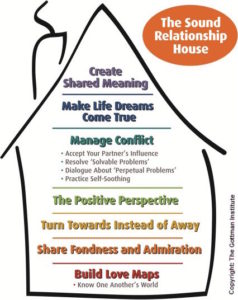The Sound Relationship: Part 1
 A great marriage needs a strong foundation. Remember the story of the three little pigs? The first little pig built his house of straw and the second made his house with wood. The third pig built his house of brick while the first two pigs played, taunting him for working so hard.
A great marriage needs a strong foundation. Remember the story of the three little pigs? The first little pig built his house of straw and the second made his house with wood. The third pig built his house of brick while the first two pigs played, taunting him for working so hard.
When the big bad wolf came to blow their houses down, the first two pigs ran to the third pig’s home and sheltered there, safe and secure from the wolf.
Big bad wolves can come to marriage at any time, in lots of forms: an out-of-the-blue life crisis such as an affair, job loss, or death of a loved one, for example. Or it can come as a slow erosion of love. Whether suddenly or slowly, events such as these can strain a marriage to the point of dissolution. But if your house is strong, then these crises don’t have to end your relationship. In this post, I’ll present two techniques for shoring up the relationship house’s foundations.
Love Maps: Knowing and Being Known
Based on his research, Dr. John Gottman has defined what makes a strong relationship, and he illustrates this concept by using the metaphor of a house with seven floors. The bottom floor is the Friendship System because partners must be friends to have a good marriage. That friendship can become damaged if partners don’t stay in touch with each other’s lives.
In the courtship stage of a relationship, we learn everything we can about our partners, like favorite TV shows or best friends. Gottman-style couples therapists call this kind of knowledge “love maps.” But as years go by, couples can forget to keep asking; staying in touch gets lost in the shuffle of life. In my previous post on love maps, I emphasized the importance of updating these maps as we age. What was significant to your partner five years ago may not be today. How well do you know your partner, and do you feel known? Are you updating your love maps throughout the years?
Examples of love map questions that I give couples on the first session include “What are your partner’s hobbies?” and “Who is your partner’s favorite relative?” There are sixty-two questions and in most cases, it’s a fun assignment. The ground rules are that if a person doesn’t know the correct answer, you tell them—you don’t ridicule or criticize them for not knowing. It’s an opportunity to update your love maps, not a test.
Expressing Appreciation is Essential
We enter into marriage with the blush of new love, assuming that life together will be easy and smooth. We know our partner and frequently express gratitude and admiration.
Life takes a toll on even the best relationships. Normal and expectable stressors such as children, aging parents, and job problems can consume the time a couple needs to stay close. When we are depleted by these normal stresses of living, we can forget to express our appreciation for what our partner does. Tasks such as making dinner, shopping for groceries, and picking the kids up from daycare become routine and therefore go unacknowledged.
But the happiest relationships liberally express appreciation for both the big and little things. Saying “thank you for going to the dry cleaners today” or “I appreciate that you called the sitter” seem like small things, but in saying them we help secure our foundation.
Knowing each other through updated love maps and expressing appreciation for one another strengthens a marriage against big bad wolves.


 A weekend away can bring back romance and intimacy
A weekend away can bring back romance and intimacy


